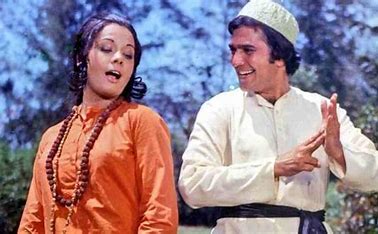
Introduction
Rajesh Khanna, often referred to as the “First Superstar” of Indian cinema, experienced an extraordinary rise to fame in the 1960s and 70s. However, his later career saw a significant decline that left many fans and industry insiders puzzled. Recently, Mumtaz, a celebrated actress and close friend of Khanna, offered her perspective on his downfall, suggesting that it wasn’t entirely his fault. She claimed that many directors acted like his ‘chamchas’ (sycophants), which contributed to the challenges he faced. This article explores Mumtaz’s insights into Khanna’s career trajectory and the role of the film industry’s dynamics in his decline.
Table of Contents
Rajesh Khanna: The Superstar Era
Rajesh Khanna’s entry into Bollywood marked the beginning of a new era. His charm, unique style, and remarkable acting skills quickly won him a massive fan following. Films like “Aradhana,” “Anand,” and “Kati Patang” solidified his status as a superstar. His ability to convey deep emotions and his on-screen charisma made him a favorite among audiences, and he became the face of romantic cinema in India.
The Peak of His Career
During his peak, Rajesh Khanna delivered a string of box-office hits that seemed unstoppable. He was the heartthrob of millions, and his movies were celebrated for their memorable songs and compelling narratives. Directors and producers were eager to work with him, and his name alone could guarantee a film’s success. However, this period of unparalleled success also sowed the seeds for future challenges.
Mumtaz’s Perspective on Khanna’s Downfall
Mumtaz, who shared a close friendship and professional relationship with Khanna, recently spoke about the reasons behind his downfall. According to her, the decline in his career was not due to any fault of his own but was significantly influenced by the people around him, particularly the directors who worked with him.
Directors as ‘Chamchas’
Mumtaz suggested that many directors who collaborated with Rajesh Khanna during his peak years acted more as his ‘chamchas’ rather than as professionals who could guide and challenge him. These sycophantic directors were more interested in pleasing Khanna than in maintaining the quality and integrity of their films. They often compromised on the script, direction, and overall production quality to align with Khanna’s preferences and whims.
Impact on Film Quality
The lack of honest and constructive feedback from directors led to a gradual decline in the quality of films Rajesh Khanna starred in. With directors failing to challenge him or provide a creative push, the scripts and characters he portrayed became repetitive and less impactful. This stagnation in his roles began to alienate the audience, who craved fresh and engaging content.
The Shift in Audience Preferences
During the 1970s and 80s, the Indian film industry witnessed significant changes. The audience’s preferences started shifting towards more action-oriented and diverse storytelling. Actors like Amitabh Bachchan emerged, bringing a new wave of cinema that emphasized larger-than-life characters and intense narratives. This shift in audience taste also contributed to Khanna’s declining popularity, as his films struggled to adapt to the changing trends.
Rajesh Khanna’s Own Struggles
While Mumtaz highlighted the role of directors, it’s also essential to consider Rajesh Khanna’s own struggles during this period. The immense pressure of sustaining his superstar status took a toll on him. Reports suggest that Khanna struggled with maintaining his personal and professional balance, which affected his performances and choices. The lack of genuine guidance from directors only exacerbated these issues.
The Importance of Constructive Feedback
Mumtaz’s comments underscore the importance of constructive feedback and professional integrity in the film industry. Directors and actors need a collaborative environment where honest feedback is valued over sycophancy. Constructive criticism helps artists grow, adapt, and evolve, ensuring that their work remains relevant and impactful.
Rajesh Khanna’s Legacy
Despite the challenges he faced later in his career, Rajesh Khanna’s contribution to Indian cinema remains unparalleled. His performances in iconic films continue to be celebrated, and he is remembered as a trailblazer who set new benchmarks for stardom in Bollywood. Mumtaz’s perspective offers a more nuanced understanding of his career, highlighting the external factors that influenced his journey.
Mumtaz’s Relationship with Khanna
Mumtaz and Rajesh Khanna shared a unique bond both on and off-screen. Their chemistry in films like “Do Raaste,” “Roti,” and “Aap Ki Kasam” was adored by audiences. Mumtaz’s insights into Khanna’s career come from a place of deep understanding and affection. Her observations shed light on the human aspects of Khanna’s life, beyond his on-screen persona.
Lessons for the Film Industry
Mumtaz’s reflections on Rajesh Khanna’s career provide valuable lessons for the film industry. They highlight the need for maintaining a balance between stardom and creative integrity. Actors and directors must foster an environment where open dialogue and professional critique are encouraged. This approach not only helps in sustaining careers but also ensures the continuous evolution of cinematic art.
Conclusion
Rajesh Khanna’s downfall was a complex phenomenon influenced by various factors, including the sycophantic behavior of some directors. Mumtaz’s candid observations offer a fresh perspective on his career, emphasizing that his decline was not entirely his fault. As the film industry evolves, the importance of honest and constructive feedback becomes even more critical. Rajesh Khanna’s legacy, however, remains intact, and he continues to be celebrated as one of Bollywood’s greatest icons.







